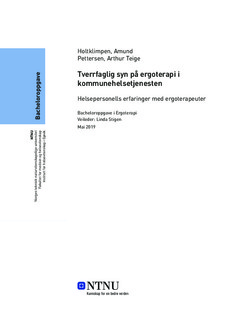Tverrfaglig syn på ergoterapi i kommunehelsetjenesten
Bachelor thesis
Permanent lenke
http://hdl.handle.net/11250/2613296Utgivelsesdato
2019Metadata
Vis full innførselSamlinger
Sammendrag
Introduksjon: I tidligere forskning kommer det frem at ergoterapeuter opplever mange forventninger til deres praksis fra sine samarbeidspartnere. Dette studiet fokuserer på hvordan helsepersonell oppfatter ergoterapeutens rolle og kompetanse i kommunehelsetjenesten. Formålet er å undersøke erfaringer og synspunkter knyttet til ergoterapeutens rolle i en kommunal setting.Metode: Studiet har benyttet en kvalitativ tilnærming ved bruk av fokusgruppeintervjuer av fire fysioterapeuter, en sykepleier og en helsefagarbeider. Resultat: I dette studiet kom det frem tre hovedtemaer, kunnskap om ergoterapi, ergoterapeutens arbeidsoppgaver og tverrfaglig samarbeid. Studiets resultater tilsier at ergoterapeuter er verdsatt og respektert blant de som kjenner til ergoterapeutens styrker og kompetanse. Det kommer frem at tett samarbeid med ergoterapeuter i en tverrfaglig setting er med på å styrke helsepersonells innsikt og kunnskap om ergoterapi. Ved mangel på erfaring i en tverrfaglig setting med ergoterapeuter, er det erfart at helsepersonell kan ha stereotypiske og forutinntatte holdninger til ergoterapi.Konklusjon: Basert på tidligere forskning og resultatene i dette studiet, må ergoterapeuter fortsette å kjempe for at forventninger til ergoterapeuter skal samsvare med det de forventer selv. Dette studier konkluderer med at det oppleves som et behov med en bevisstgjøring rundt ergoterapi blant helsepersonell som ikke jobber i direkte kontakt med ergoterapeuter. Introduction: In previous studies, occupational therapists have been found to experience many different expectations from their co-workers relating to their practice. This study focuses on the perception of healthcare professionals on occupational therapy in the municipal health service. The purpose is to investigate experiences and individuals’ perspectives related to occupational therapy.Method: A qualitative approach by conducting two group interviews was used in this study. In total, four physical therapists, one nurse and one health worker were interviewed.Results: Three main themes emerged through the analysis. These are knowledge of occupational therapy, occupational therapists’ work tasks and interdisciplinary collaboration. The results of this study highlight how occupational therapy is a respected and appreciated profession to those who are familiar with the core values and competence of occupational therapists. Close interdisciplinary collaboration is essential in order to strengthen healthcare professionals understanding of occupational therapy.The results indicate that occupational therapist can experience stereotypical assumptions and attitudes from healthcare professionals, by them having a lack of knowledge of occupational therapy.Conclusion: Based on previous research and the results conducted in this study, occup ational therapists must continue to fight for the expectations on occupational therapy competence to match their own. Thereis a need for greater awareness of occupational therapy among healthcare professionals; who do not have direct working relationships with occupational therapists.
